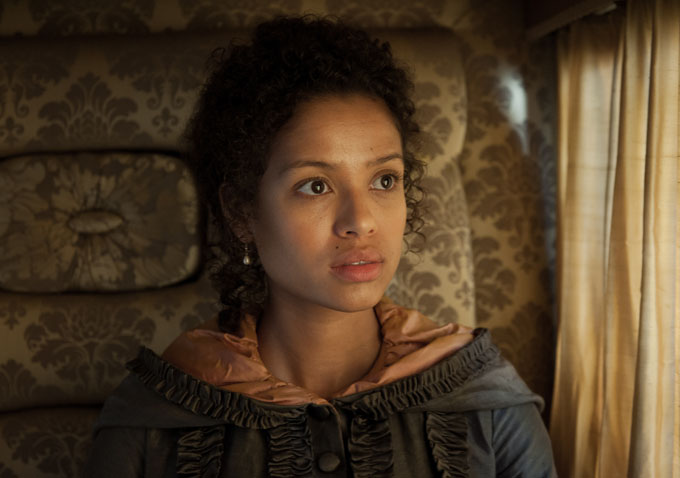
Adaptations of Jane Austen’s work and other Georgian-era-set films arrive via indie theaters and PBS almost as though they’re on a schedule. Fans of witty stories of class-defying romance get their fix of empire-waist dresses, demure courtships and misunderstandings every year or so, but there’s often little to differentiate one from another (not that we complain when a new adaptation appears). Based on a true story, director Amma Asante’s “Belle” has every element that costume drama fans love, but it elevates a standard love story by adding larger historical implications and giving us a new perspective on the era.
In 1769, after the death of her mother, a young Dido Elizabeth Belle (Lauren Julien-Box) is brought to the home of her naval officer father’s uncle to be raised as though she were a legitimate daughter. Though her mother was an African slave, her great uncle Lord Mansfield (Tom Wilkinson) loves her as his own child, despite the complex societal rules that attempt to define her place. As she grows up alongside her cousin Elizabeth (Sarah Gadon), the differences in their futures become ever more stark. As a young woman on the verge of coming out into society, Dido (Gugu Mbatha-Raw) is an heiress, but her mixed racial heritage keeps her from finding an equal match. Meanwhile her beloved, beautiful cousin has little to offer in terms of a dowry, putting her in a difficult position as well.
“Belle” has all the wit and heart of a standard Jane Austen adaptation, but there’s more weight here. Dido and her cousin Elizabeth struggle with issues familiar to fans of Georgian-era-set fiction, particularly class, money, and the role love does or doesn’t play in courtship and marriage. But in addition to that, Asante’s Dido contends with issues of racial and societal identity as she feels like she neither fits with the family who has raised her or the servants to tend to them. Characters’ reactions to Dido and her racial heritage are varied and complex, including horror, exoticization, and respect. Adding to this is her great uncle Lord Mansfield’s position as the most powerful judge in the land, who is set to rule on a case involving a slave ship that could affect England’s slave trade as a whole. He is at odds with his apprentice John Davinier (Sam Reid), a parson’s son with ambitions to move past his lowly station and become a lawyer. Davinier also becomes a rival for Dido’s affections, contending with the aristocratic Oliver Ashford (James Norton) for her hand.
Though Mbatha-Raw has had roles in short-lived series “Touch” and “Undercovers” as well as a number of other credits, she feels like a fresh discovery here. Dido requires her to be alternately fearful and full of grace, confident in who she is while feeling at odds with her own blood. She holds her own with some of Britain’s best talent, and it feels natural for her to be on screen with Wilkinson, Miranda Richardson, Emily Watson and Penelope Wilton.
We would’ve liked to see much more of Watson, who really only gets one meaty scene in the film as Dido’s great aunt, while we want Wilton (most recognizable as Isobel Crawley in “Downton Abbey”) to be in every British film to add a bit of levity as a persnickety aunt or a feisty grandmother. Meanwhile, Reid’s John Davinier is made from the mold of Fitzwilliam Darcy, at first cold and at odds with our heroine, but then there’s (unsurprising) depth and passion. We went weak in the knees more than a few times thanks to Reid’s earnestness. Smelling salts, please.
At times, “Belle” suffers from a lack of subtlety in its storytelling, as well as seeming to inject additional drama into Dido’s already incredible story. However, Asante’s film is entirely successful at what it wants to be and should charm its intended audience (and then some). This is only the director’s second film, after 2004’s “A Way of Life,” but “Belle” is in capable, assured hands. It has all the hallmarks of the genre style-wise, but it never feels stuffy. Fans of the genre have spent a lot of time in this world, but we’re seeing it through new eyes. [B+]

